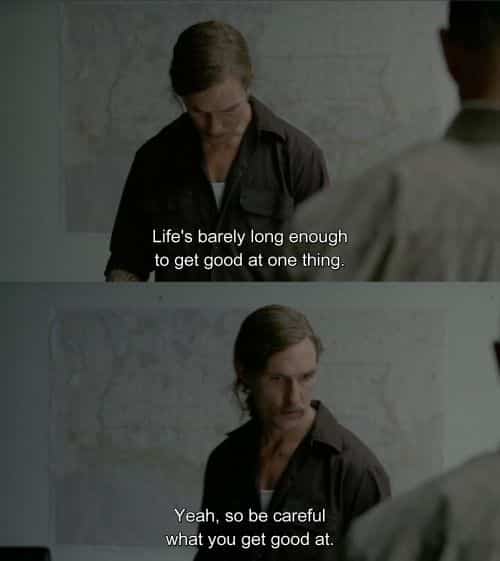“Dharma isn’t just passion and skills. Dharma is passion in the service of others. your passion is for you. Your purpose is for others. Your passion becomes a purpose when you use it to serve others. Your dharma has to fill a need in the world.”
Jay Shetty, Think Like A Monk (Page 122)
“It is trust in the limits of the self that makes us open and it is trust in the gifts of others that makes us secure. We come to realize that we don’t have to do everything, that we can’t do everything, that what I can’t do is someone else’s gift and responsibility… My limitations makes space for the gifts of other people.”
Sister Joan Chittister, via Think Like A Monk (Page 100)
“Internal power and confidence are born of insight and proficiency. When you understand something, or you’re good at something, you feel strong, and it makes you feel like you have something to offer. When you have adequately cultivated your unique skills and gifts, then you’re excited about approaching and interacting with the world.”
Will Smith, Will (Page 69)
“In school, you are graded on every test—even if it’s your weakest subject. In life, you can choose the tests you take—even if they always play to your strengths. Maintain a baseline so your weak areas don’t hold you back, but design your life so you are graded on your strengths.”
James Clear, Blog
The Difference Between Amateurs and Professionals
Excerpt: Inspired by a thread posted by Sahil Bloom, here are (some of) the main differences between amateurs and professionals. And they’re not small.
Read More »The Difference Between Amateurs and Professionals
“Practical knowledge is the ultimate commodity and is what will pay you dividends for decades to come—far more than the paltry increase in pay you might receive at some seemingly lucrative position that offers fewer learning opportunities.”
Robert Greene, The Daily Laws (Page 53)
“Your Life’s Task does not always appear to you through some grand or promising inclination. It can appear in the guise of your deficiencies, making you focus on the one or two things that you are inevitably good at. Working at these skills, you learn the value of discipline and see the rewards you get from your efforts. Like a lotus flower, your skills will expand outward from a center of strength and confidence.”
Robert Greene, The Daily Laws (Page 24)
12 Cal Newport Quotes from ‘So Good They Can’t Ignore You’
Excerpt: Follow your passion is bad advice. Read these powerful Cal Newport quotes from ‘So Good They Can’t Ignore You’ and find out why…
Read More »12 Cal Newport Quotes from ‘So Good They Can’t Ignore You’
“The more you try to force it, I learned, the less likely you are to succeed. True missions, it turns out, require two things. First you need career capital, which requires patience. Second, you need to be ceaselessly scanning your always-changing view of the adjacent possible in your field, looking for the next big idea. This requires a dedication to brainstorming and exposure to new ideas. Combined, these two commitments describe a lifestyle, not a series of steps that automatically spit out a mission when completed.”
Cal Newport, So Good They Can’t Ignore You
“If your goal is to love what you do, you must first build up ‘career capital’ by mastering rare and valuable skills, and then cash in this capital for the traits that define great work.”
Cal Newport, So Good They Can’t Ignore You
“If you want to love what you do, abandon the passion mindset (‘what can the world offer me?’) and instead adopt the craftsman mindset (‘what can I offer the world?’).”
Cal Newport, So Good They Can’t Ignore You
“Don’t obsess over discovering your true calling. Instead, master rare and valuable skills. Once you build up the career capitol that these skills generate, invest it wisely. Use it to acquire control over what you do and how you do it, and identify and act on a life-changing mission. This philosophy is less sexy than the fantasy of dropping everything to go live among the monks in the mountains, but it’s also a philosophy that has been shown time and again to actually work.”
Cal Newport, So Good They Can’t Ignore You (Page 230)
“Doing things we know how to do well is enjoyable, and that’s exactly the opposite of what deliberate practice demands… Deliberate practice is above all an effort of focus and concentration. That is what makes it ‘deliberate,’ as distinct from the mindless playing of scales or hitting of tennis balls that most people engage in.”
Geoff Colvin, via So Good They Can’t Ignore You (Page 96)
“All of us who do creative work… you get into this thing, and there’s like a ‘gap.’ What you’re making isn’t so good, okay?… It’s trying to be good but… it’s just not that great. The key thing is to force yourself through the work, force the skills to come; that’s the hardest phase.”
Ira Glass, via So Good They Can’t Ignore You (Page 47)
“If you want something that’s both rare and valuable, you need something rare and valuable to offer in return—this is Supply and Demand 101. If follows that if you want a great job, you need something of great value to offer in return.”
Cal Newport, So Good They Can’t Ignore You (Page 44)
“The happiest, most passionate employees are not those who followed their passion into a position, but instead those who have been around long enough to become good at what they do. On reflection, this makes sense. If you have many years’ experience, then you’ve had time to get better at what you do and develop a feeling of efficacy. It also gives you time to develop strong relationships with your coworkers and to see many examples of your work benefiting others. What’s important here, however, is that this explanation, though reasonable, contradicts the passion hypothesis, which instead emphasizes the immediate happiness that comes from matching your job to a true passion.”
Cal Newport, So Good They Can’t Ignore You (Page 17)
“Don’t follow your passion; rather, let it follow you in your quest to become, in the words of my favorite Steve Martin quote, ‘so good that they can’t ignore you.'”
Cal Newport, So Good They Can’t Ignore You (Page xx)
So Good They Can’t Ignore You [Book]

Book Overview: In this eye-opening account, Cal Newport debunks the long-held belief that “follow your passion” is good advice. Not only is the cliché flawed-preexisting passions are rare and have little to do with how most people end up loving their work—but it can also be dangerous, leading to anxiety and chronic job hopping. After making his case against passion, Newport sets out on a quest to discover the reality of how people end up loving what they do. Spending time with organic farmers, venture capitalists, screenwriters, freelance computer programmers, and others who admitted to deriving great satisfaction from their work, Newport uncovers the strategies they used and the pitfalls they avoided in developing their compelling careers. Matching your job to a preexisting passion does not matter, he reveals. Passion comes after you put in the hard work to become excellent at something valuable, not before. In other words, what you do for a living is much less important than how you do it.
Post(s) Inspired by this Book:


